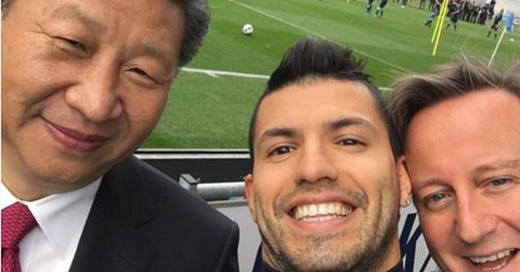A draft extract from my forthcoming book, ‘Where’s The Money Gone? One Fan’s Football Finance Odyssey
Sergio Aguero leans back with a huge grin as he takes a selfie against the background of Manchester City’s gleaming new Academy stadium.
As players warm up on the turf behind him, the then UK Prime Minister David Cameron edges into shot over his left shoulder, beaming like a cheeky photo bomber.
On Aguero’s right hand side, looking rather more restrained, is China’s President Xi Jinping.
It’s October 23, 2015 and Xi is in town to visit the sprawling Etihad campus which has turned acres of suburban wasteland in East Manchester into prime football real estate.
This Presidential visit turns out to be the high tide of a short-lived period of Anglo-Sino rapprochement.
The ebb and flow of that wave would prove to have profound implications for my own club, West Brom, and several others in English football, including Aston Villa, Reading, and Southampton, who all found themselves under Chinese ownership.
The important thing to remember is that it was no accident.
As Xi and Cameron’s visit to the Etihad demonstrates, the UK government actively encouraged these new investors, and business ties between the countries developed rapidly during this period.
In 1999, China was the UK’s 26th largest export market; by 2024, it had risen to fifth. Over the same period, Chinese imports rose from 15th to 4th in the UK’s trading league table.
To find out more I hopped on a video call with Professor Simon Chadwick, an expert in Chinese football and geopolitics at the SKEMA Business School in Paris.
He told me the UK had long been keen to embrace this recently emergent economic giant - but that it was a slow process which began with Tony Blair’s premiership in the late 90s.
Chadwick said: “Blair really courted the Chinese government, in part, through football.
“He saw the value of the power of football as an instrument of diplomacy. And so he frequently used football in trade missions to China.”
Blair even took former England manager Bobby Robson for a kickabout with local teenagers at Beijing's Yue Tan stadium in 2005, the year China overtook Britain to become the world’s fourth largest economy,
When the Conservatives came to power in 2010, Prime Minister David Cameron and his Chancellor George Osborne picked up the baton.
Chadwick said, “Osborne and Cameron were big fans of China, and of Britain having a relationship with China, and they were also advocates of the power of football.”
They found a willing listener in President Xi. In 2011, a year before he became China’s paramount leader, he outlined a bold vision for his nation to become a global soccer superpower.
China had previously qualified for only one World Cup - the 2002 tournament in Korea and Japan - where they lost all three group matches without scoring a goal.
Undeterred, Xi set out the twin ambitions of hosting the tournament and seeing his nation win it.
If this seemed far-fetched, it should be recognised that China’s enthusiasm for football has deep roots.
The women’s national team has enjoyed considerable success, winning the Asia Cup on nine occasions. They also reached the Women’s World Cup Final in 1999 before losing to the USA.
Half a dozen teams in the men’s Chinese Super League attract average gates in excess of 25,000 with Beijing Guoan regularly drawing double that to the Workers Stadium.
The English Premier league is also popular amongst Chinese fans. Before the pandemic, Manchester United launched a preview in Beijing of an immersive ‘Experience Centre’ which it planned to roll out across major Chinese cities.
Small wonder, then, that politicians on both sides of the bamboo curtain saw football as a natural bridge between the two nations, leading to that iconic Aguero selfie with Xi and Cameron in 2015.





A piece about how China's footballing dreams remain unfulfilled...
https://www.bbc.co.uk/news/articles/ce8vp2e7p64o